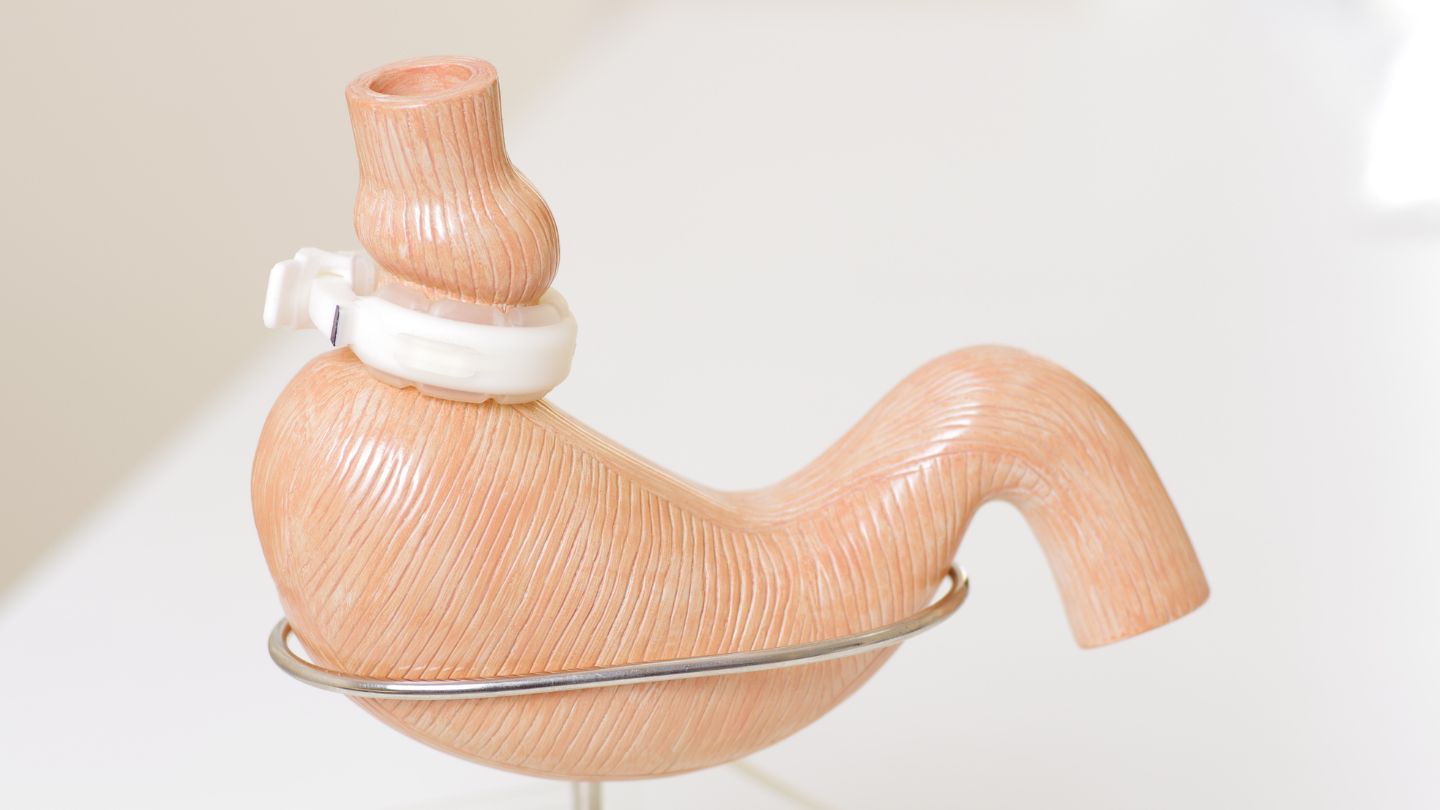
Am I Eligible for Lap Band Surgery? Requirements Explained
Are you wondering, “Am I eligible for lap band surgery?” Key criteria include having an appropriate BMI, a history of unsuccessful weight loss attempts, and a commitment to lifestyle changes. This blog breaks down these requirements to help you find out if you qualify.
Key Takeaways
- Eligibility for lap band surgery requires a BMI between 30 and 45, a history of being significantly overweight for at least five years, and documented unsuccessful weight loss attempts through diet and exercise.
- Candidates must demonstrate a willingness to embrace lifestyle changes, including adopting a healthier diet and increased physical activity post-surgery, to ensure sustainable weight loss.
- Comprehensive medical and psychological evaluations are necessary for determining eligibility, alongside regular follow-up care to monitor progress and make adjustments for optimal results.
Understanding BMI Requirements

Eligibility for adjustable gastric band surgery heavily depends on an individual’s Body Mass Index (BMI). This figure, derived from a person’s height and body weight, allows healthcare professionals to determine if someone is a suitable candidate for the procedure. Typically, candidates should have a BMI that falls between 35 and 40 with obesity-related conditions or a BMI of 40 or higher to qualify. For individuals with a BMI between 30 and 35, eligibility may be considered if significant health risks associated with obesity are present.
In cases where an individual’s BMI exceeds 45, other forms of bariatric procedures, such as sleeve gastrectomy or gastric bypass, might be recommended. These options are specifically tailored to induce significant weight loss for those with higher BMIs than what is optimal for adjustable gastric band intervention.
When exploring insurance coverage, it is often necessary to provide proof of BMI history and records of previous weight loss attempts. These documents help justify surgical intervention, demonstrating that alternative methods were unsuccessful in achieving sustainable weight management goals.
Long-Term Obesity and Weight Loss Attempts
Individuals must have grappled with significant body weight issues for a minimum of five years to qualify for lap band surgery. This extended period of being overweight signifies the persistent character of their obesity, highlighting the necessity for a durable solution such as bariatric surgery.
Eligibility also hinges on having an established record of unsuccessful efforts at shedding excess weight. These endeavors should encompass diet and physical activity changes to show that they’ve earnestly attempted traditional methods to reduce their weight prior to resorting to surgical intervention like lap band surgery.
These trials are not merely indicators of your commitment but provide crucial insight into dietary patterns and lifestyle choices. A deeper understanding obtained from these attempts enables medical experts to tailor-make the band surgery according to one’s unique needs, thereby improving prospects for long-term successful management of weight loss.
Willingness to Embrace Lifestyle Changes
Eligibility for adjustable gastric band surgery hinges critically on a person’s willingness to make substantial lifestyle adjustments. To sustain the weight loss facilitated by the procedure, individuals must integrate a nutritious diet and regular physical activity into their daily routine after surgery.
Adopting healthy eating habits, practicing portion control, and engaging in consistent physical exercise are essential for maintaining the benefits of adjustable gastric band surgery. Our dedicated team offers nutritional counseling and support to help patients successfully navigate these lifestyle changes.
Prior attempts at losing weight, including structured dieting and exercise programs lasting three to six months, are often required before pursuing surgical intervention. These efforts demonstrate an individual’s readiness and commitment to long-term behavioral changes essential for successful weight management after surgery.
Medical and Health Evaluations
Candidates must undergo comprehensive medical and health evaluations to ensure they are suitable for lap band surgery. These evaluations assess overall health and identify any obesity-related issues that could complicate the surgery. Conditions such as heart disease, diabetes, and high blood pressure may disqualify candidates if they pose significant risks.
Medical clearance is a crucial step in the pre-surgery process. This involves a series of tests, including evaluations of heart and lung function, bloodwork, and possibly additional examinations. These tests determine whether you are physically fit to undergo the surgery and handle the required anesthesia.
Anesthesia preparation is a vital part of the medical evaluation. Individual health factors, such as sleep apnea, can influence the anesthesia plan to minimize risks and complications during surgery.
Psychological Readiness
Psychological preparedness is just as vital as physical preparation for lap band surgery. Individuals must mentally brace themselves to face the obstacles that accompany their journey toward weight loss, which includes grasping the possible outcomes and associated risks of the procedure in order to form achievable expectations.
The examination of one’s social support systems plays a pivotal role in ensuring psychological readiness. Having robust backing from family, friends, and supportive groups can immensely impact your post-surgery adherence and overall experience positively by providing motivation and accountability necessary to maintain progress.
Evaluation of a candidate’s past attempts at losing weight may be conducted to gauge their mental preparedness and determine if surgical intervention is needed. Such assessments confirm whether candidates are psychologically equipped to navigate through profound lifestyle changes after undergoing weight loss surgery.
Commitment to Follow-Up Care
Regular follow-up care is vital for ensuring the long-term success of adjustable gastric band surgery. At WellStar, patients are encouraged to schedule frequent check-ups to monitor their health and the effectiveness of the procedure. These follow-ups allow for adjustments to the band, ensuring optimal outcomes.
We also provide access to support groups, nutritional counseling, and multidisciplinary care to guide patients through their recovery journey. These resources are essential for helping patients maintain healthy habits, sustain weight loss, and address any concerns that may arise.
Adjustments to the band, particularly within the first year after surgery, require careful monitoring to optimize effectiveness. Our experienced team ensures that each patient receives tailored follow-up care, empowering them to achieve their weight loss and wellness goals.
Consulting a Specialist
It is essential to seek advice from a specialist to establish if you’re a candidate for lap band surgery. An individual assessment with a bariatric surgeon will offer the most accurate determination of your eligibility for this weight loss procedure. It’s vital during these discussions to thoroughly examine your health history and articulate your weight loss objectives.
Each patient’s care strategy is customized by surgeons based on their unique motivations and desired outcomes, ensuring that the proposed surgical plan resonates with their personal requirements. Every consultation reflects an individual’s distinct medical background and life situation, so posing targeted questions can help dispel uncertainties and enhance comprehension of what the surgery entails.
The consultation process provides an opportunity to connect with your surgeon, reinforcing trust in your choice to undergo lap band surgery. Fostering transparent communication is fundamental in devising an effective treatment blueprint together with your surgeon.
Types of Bariatric Surgery Options

WellStar Comprehensive Bariatric Services offers a wide range of advanced bariatric procedures designed to support sustainable weight loss and improve overall health. Our expert team specializes in adjustable gastric band procedures, laparoscopic sleeve gastrectomy, and Roux-en-Y gastric bypass, tailoring each treatment plan to your unique health needs and goals. From initial consultation to long-term follow-up care, We are committed to guiding you every step of the way toward a healthier future.
For instance, the Roux-en-Y gastric bypass is renowned for significant weight reduction and improvement of obesity-related conditions. Alternatively, sleeve gastrectomy offers rapid weight loss without altering the intestinal pathway. Adjustable gastric band surgery provides a less invasive option for weight management with the flexibility of band adjustments over time.
Our comprehensive approach ensures patients receive personalized care at every step, from initial consultation to post-surgery follow-up, offering the support needed to achieve long-term success.
Preparing for Lap Band Surgery
Preparation is essential for successful lap band surgery. Understanding nutrition and consulting with a registered dietitian help patients learn about necessary dietary changes, including portion sizes and hydration. A structured weight loss and exercise plan, with documented goals and regular physical activity, is important before surgery.
Adopting positive habits, such as improving sleep and managing stress, can ease the transition to post-surgery life. Patients should gather information and attend educational sessions to set accurate expectations for the surgery. These preparations help ensure patients are physically and mentally ready for the changes ahead.
Recovery and Post-Surgery Support

The period following lap band surgery is vital for ensuring its lasting effectiveness, with patients typically remaining in the hospital from one to two days post-operation. The success of such minimally invasive bariatric surgeries hinges on proper aftercare.
Consistent check-ups are essential for overseeing weight reduction and addressing any complications that may arise following gastric band surgery. Participation in support groups can greatly improve prospects of sustained weight management following the procedure.
To secure sufficient nutrition after undergoing band surgery, it’s important for individuals to adhere to a diet rich in protein while minimizing carbohydrate intake.
Summary
To qualify for adjustable gastric band surgery, patients must meet specific criteria, such as adhering to BMI guidelines, having a history of obesity, and demonstrating readiness to embrace significant lifestyle changes. Thorough medical and psychological assessments are vital to ensure that patients are well-prepared for their weight loss journey.
At Wellstar Comprehensive Bariatric Services, our weight loss surgeons serve East Cobb, Marietta, Austell, Smyrna, LaGrange, and other locations across Georgia. We provide personalized care, from initial consultation to ongoing follow-up support. With a commitment to patient success, we ensure that every individual receives the guidance and resources needed to achieve sustainable weight loss and improved health. Ready to transform your life? Contact us today!
Frequently Asked Questions
What BMI is required for lap band surgery?
To be eligible for lap band surgery, it is critical to have a BMI within the range of 30 to 45. This criterion must be met to qualify for the band surgery procedure.
How long do I need to have been overweight to qualify for surgery?
To qualify for surgery, you typically need to have been significantly overweight for at least five years. This duration demonstrates a long-term struggle with weight management.
What medical conditions might disqualify me from surgery?
You may be disqualified from surgery if you have medical conditions such as heart disease, diabetes, or hypertension, as they can significantly increase the risks associated with the procedure. It is essential to discuss your health history thoroughly with your healthcare provider before proceeding.
What kind of follow-up care is required after surgery?
After surgery, regular follow-up visits, participation in support groups, and nutritional counseling are crucial for monitoring health and ensuring long-term success. These measures help maintain optimal recovery and well-being.
